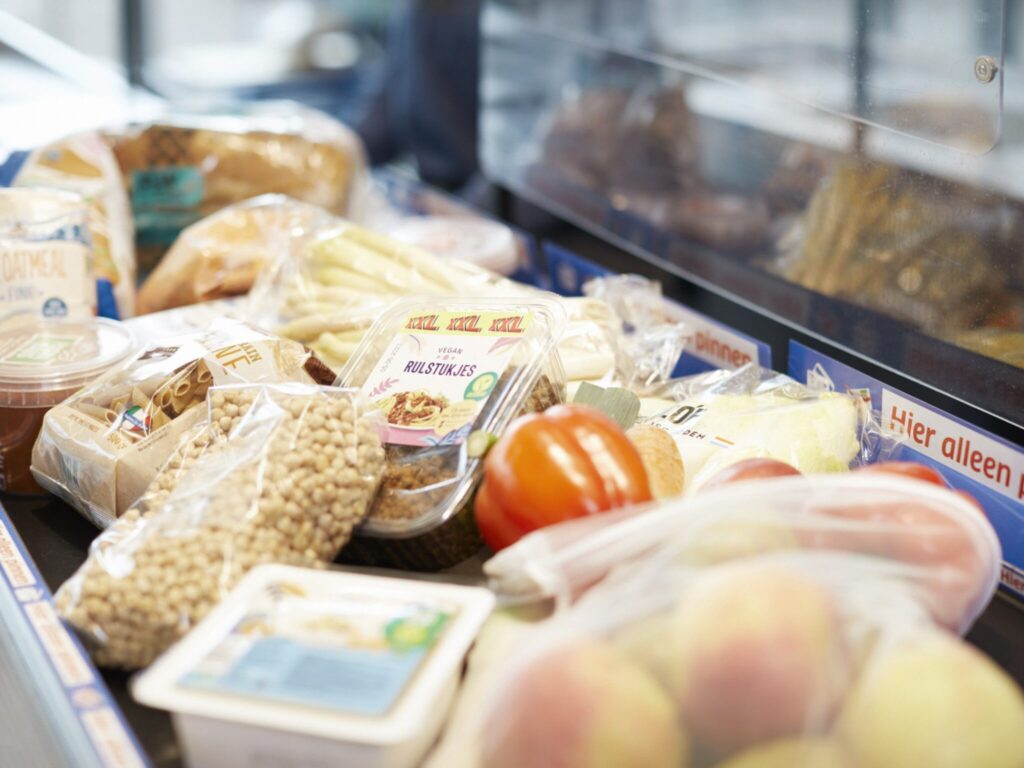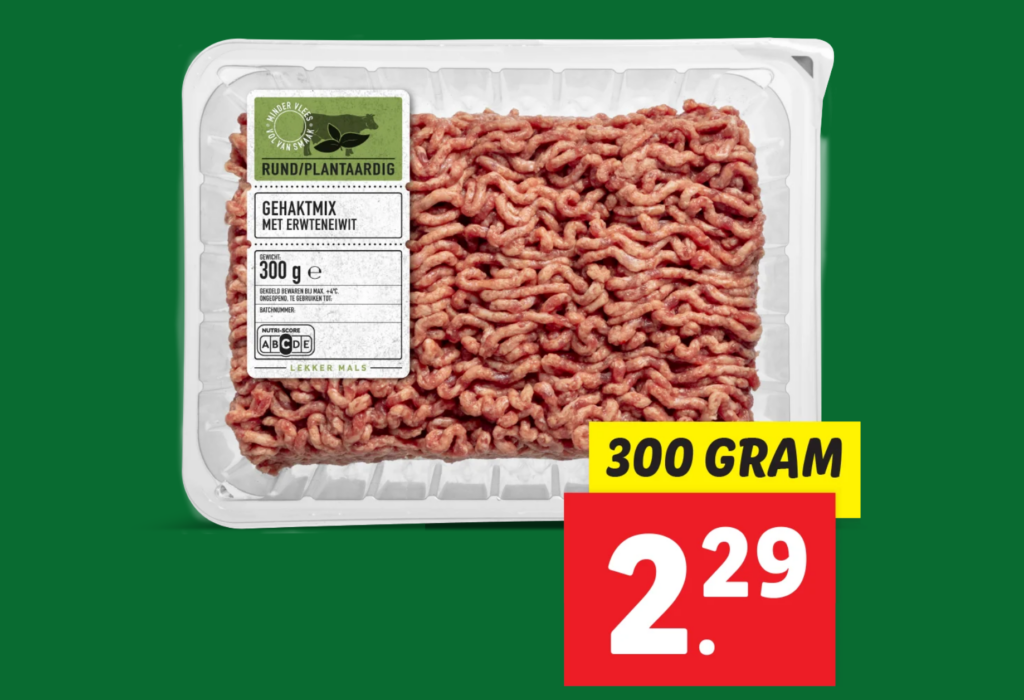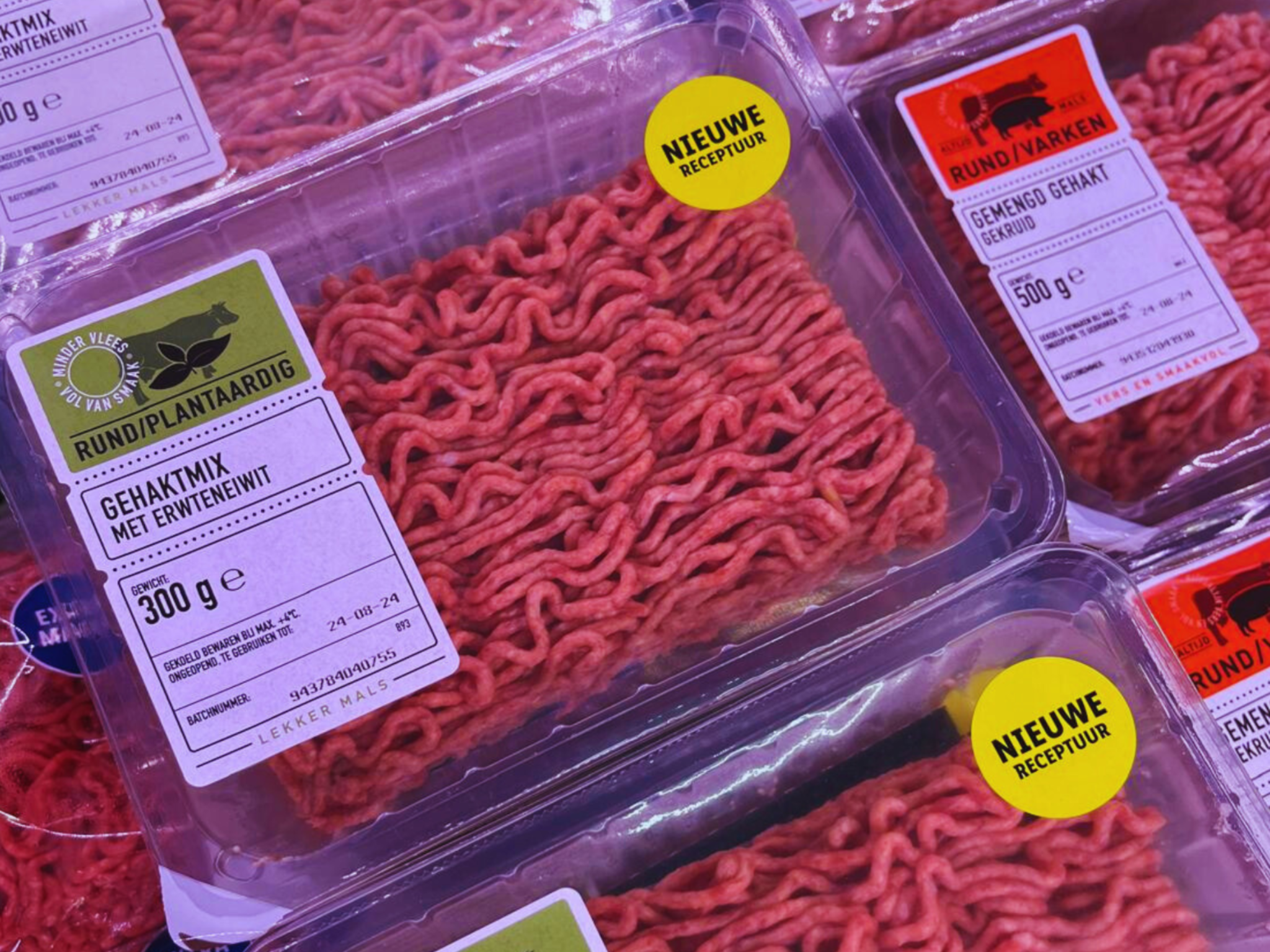Lidl Netherlands Dives Into Blended Meat, With Plant-Based Proteins Now Costing the Same As Meat & Dairy
5 Mins Read
In the Netherlands, discount retailer Lidl has introduced a blended minced meat SKU with pea protein, and reduced the price of its plant-based meat and dairy products.
With a new product and pricing strategy, Lidl Netherlands has taken a major step towards its 2030 goal of making 60% of all protein sales plant-based.
The discount supermarket has launched its first blended meat product, a minced meat mix with 60% beef and 40% pea protein. It has a lower impact on both the climate and consumer wallets.
In addition, it has permanently decreased the prices of its own-label vegan meat and dairy analogues, which will now be priced either the same as their conventional counterparts, or even lower than them.
“Much work is being done by supermarkets to encourage the purchase of plant-based food, but this move by Lidl in the Netherlands represents a hugely significant shift in the way supermarkets approach food system change,” said Jasmijn de Boo, CEO of ProVeg International.
Lidl establishes economic parity for Vemondo range

Pricing has been a major climate strategy for Lidl across several markets. It first achieved price parity for products in its private-label Vemondo brand in its home country of Germany, before extending that to Denmark, Hungary, Austria and Belgium.
In the Netherlands, it conducted a six-month pilot that involved putting its plant-based meat SKUs next to the conventional meat aisle in 70 stores. The result was a 7% hike in sales, with visibility, taste and volume the key factors.
The retailer extended this placement approach across its 440 stores in the Netherlands, and has now brought its pricing strategy to the country too. It means that meat analogues like vegan burgers and sausages, and alt-dairy products such as plant-based yoghurt, cheese and crème fraîche now either cost the same as meat and dairy, or are cheaper.
This is key to consumer adoption: in 2023, a UK-based study by ProVeg showed that people are dramatically more likely to buy plant-based foods over their animal-derived equivalents when the former are lighter on the wallet.
Meanwhile, another survey by the food advocacy organisation revealed that plant-based analogues are now cheaper overall than meat and dairy in nearly all Dutch supermarkets, which – like Lidl – have committed to the 60/40 ratio by the end of the decade.
“Shifting to more plant-based diets is vital if we are to successfully stabilise CO2 emissions and halt habitat and biodiversity loss around the world,” said de Boo. “Supermarkets play a huge role here and Lidl has shown what can be done to encourage this shift. We urge other supermarket chains to compete with Lidl with their promotion of plant-based foods.”
A report by Madre Brava last month suggested that Lidl and Ahold Delhaize are leading the protein transition in the retail world, aligning their sales goals with climate targets. Lidl is working towards public targets across its locations, having published goals in six countries, with others to follow suit soon. “Doing so within this year could potentially turn Lidl into the first supermarket chain to publicly commit to align their protein offerings with human and planetary health goals,” the report said.
Taking on blended meat years after retailers’ failed attempts

In 2019, Aldi brought out a BBQ Flexitarian Burger made from a mix of beef and beans, which got widely panned. Two years later, Tesco introduced a Lean & Greens range that combined chicken with vegetables. In both instances, the products are now discontinued.
Blended meat – especially from private-label brands – wasn’t commercially successful. But things have changed now. Everyone from Nestlé and Purdue Farms to Quorn in the NHS and even Disneyland are dabbling with these products, which deliver an improvement on the climate credentials and represent more uptake among meat-eaters and flexitarians.
Lidl Netherlands has made a major move towards lowering its climate footprint. Beef is the most polluting food on the planet, and by subbing out 40% of it with pea protein (whose emissions are 90 times lower), the retailer’s new minced meat produces 37% fewer emissions.
According to Lidl, half of the population in the Netherlands eats minced meat every week. But a large European survey this year found that 49% of Dutch consumers have reduced their meat consumption compared to 2023. And the top two factors for purchasing plant-based analogues are taste and price, two attributes Lidl’s alternative proteins must get right.
“The taste is the same, but the environmental impact and price are lower,” promised Geert de Vries, a buyer at Lidl. The 300g mince – available in all its Dutch stores now (and yes, placed right next to meat) – will set consumers back €2.29, a 33% improvement on ground beef.
“The development took quite a while. We wanted to develop a minced meat mix that contains less meat, but retains the taste,” said de Vres. “I daresay that even for the real meat lover, this minced meat mix is indistinguishable from regular minced meat.”
Martine van Haperen, health and nutrition expert at ProVeg Netherlands, lauded Lidl’s two initiatives. “Price is the main obstacle for people to choose plant-based more often. The step to make plant-based products the same price or cheaper than meat and dairy removes that obstacle,” she said.
“Also, not everyone wants to eat meat substitutes or legumes. By introducing a hybrid product, just in the meat section, they really appeal to the meat eater. They don’t even have to change their consumption pattern. This is a valuable addition that really gives Lidl the opportunity to influence the protein ratio.”



